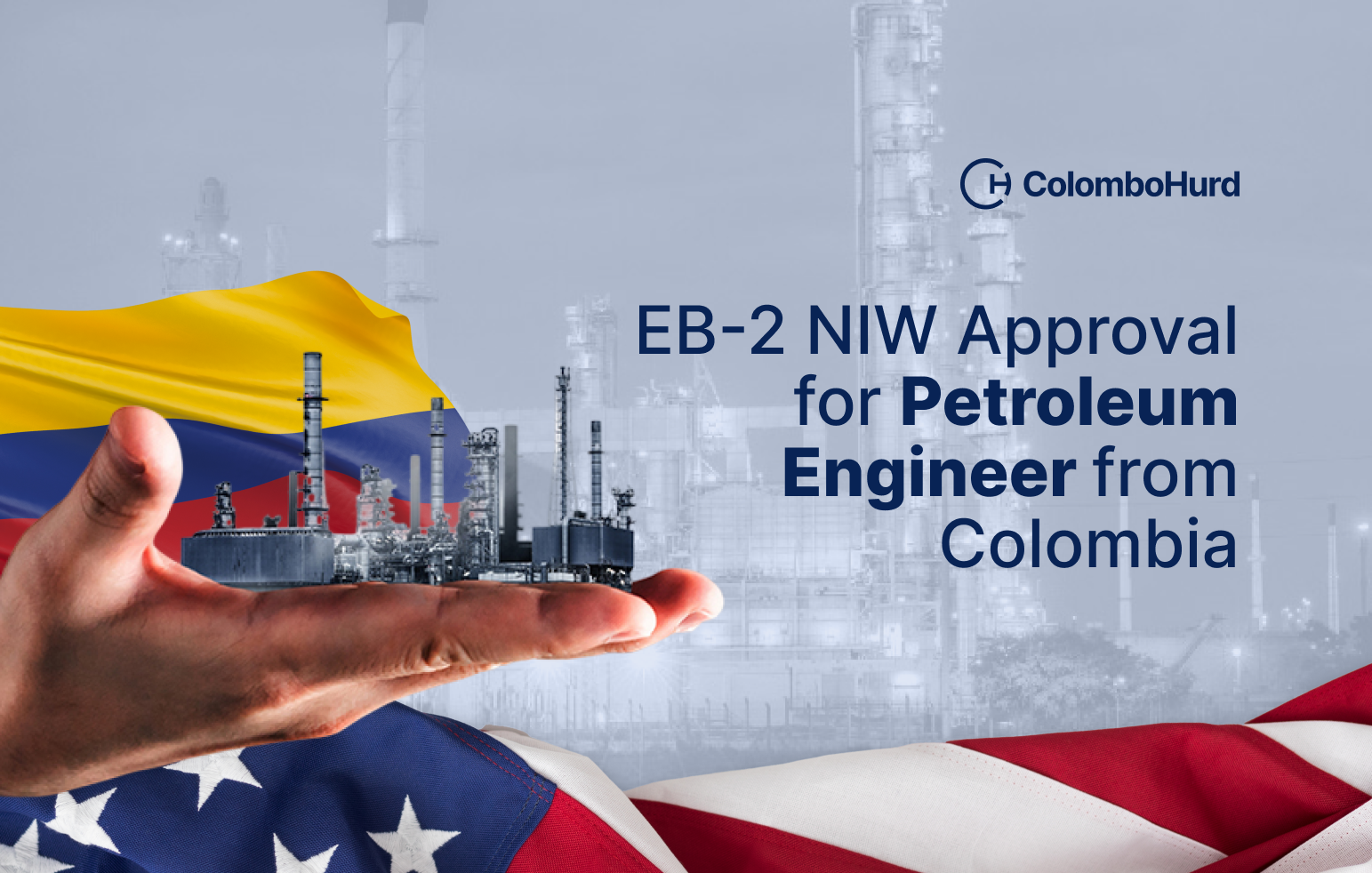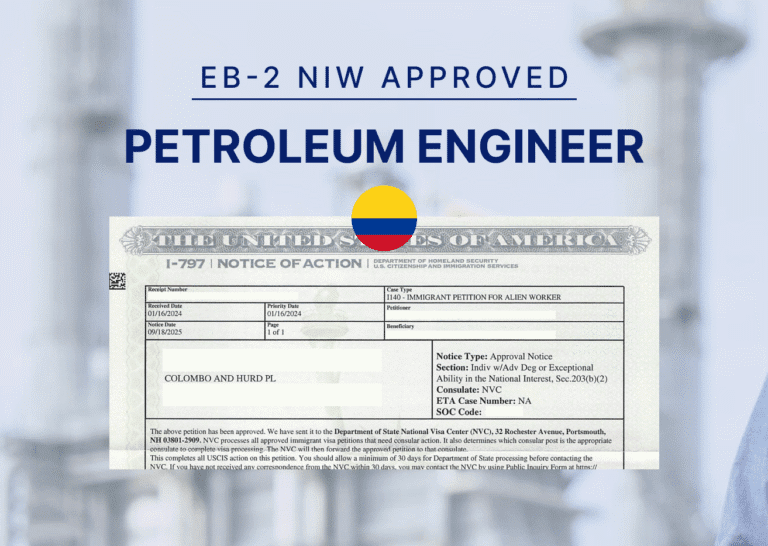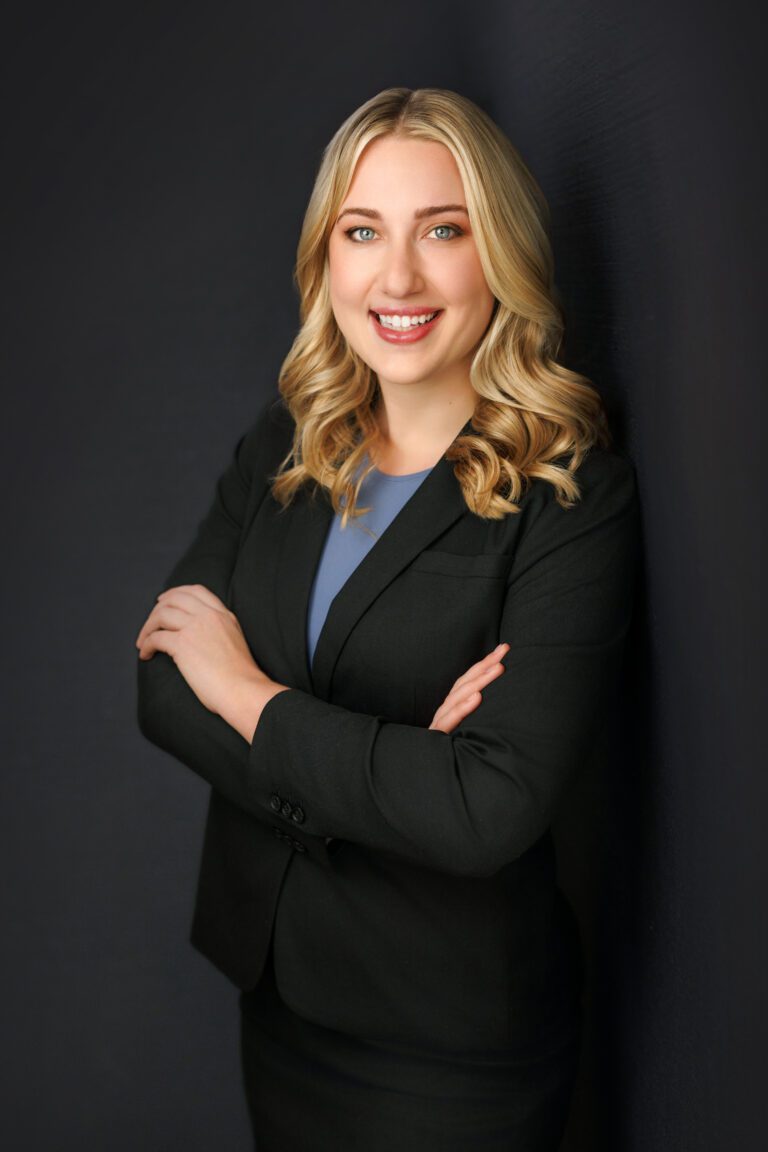Petroleum Engineer
Oil and gas engineers remain central to the U.S. energy economy, driving advances in production efficiency, automation, and data integration. As the United States continues to pursue energy independence and modernization, professionals capable of bridging engineering precision with business strategy are increasingly vital to strengthening the nation’s infrastructure.
That’s where one Colombian petroleum engineer found his niche. Represented by Attorney Allison McVey of Colombo & Hurd, he developed a plan to help small and mid-sized oil and gas companies adopt data-driven tools that improve drilling accuracy, optimize production, and streamline resource management.
His EB-2 National Interest Waiver petition was approved without a Request for Evidence (RFE) on September 18, 2025, just eight months after filing. The outcome reflected both the strength of his professional record and the clear real-world value of his project.

Technical Expertise and Entrepreneurial Vision

With his Master’s Degree in Business Administration of International Management and Bachelor’s Degree in Petroleum Engineering, our client has both technical expertise and strategic business insight. His proposed endeavor involves developing and implementing data management systems for small and medium-sized oil and gas enterprises (SMEs) to monitor, control, and optimize drilling and production processes from exploration through secondary recovery.
Ms. McVey notes that having both an MBA and a Bachelor’s in petroleum engineering “made for an interesting profile that allowed us to focus on the business administration aspect of his work in conjunction with the technical.”
By clearly outlining his role in advancing efficiency, automation, and data-driven decision-making, the petition demonstrated how his work addresses key operational challenges in the American energy landscape.
“Oil and gas professionals tend to have strong profiles to begin with, but he took it further,” Ms. McVey recalls. “He created a ‘try-and-buy’ model for his automation services so potential U.S. clients could test his systems without commitment. That strategy led to multiple Letters of Interest, which showed genuine market traction, and I believe that’s what helped get the case to approval.”
Translating Specialized Expertise into a Clear National Value
Our client had significant experience in petroleum engineering, but his limited publication record required a petition that emphasized practical industry impact over academic output. Ms. McVey explains that “writing in plain language about automation and emerging tech for an already specialized field is always a challenge.” The key, she says, was to “strike a balance between demonstrating the client’s specialized skills while keeping it easily digestible to the officer.”
We also had to convey the importance of modernization within the traditional oil and gas industry. The goal, Ms. McVey says, was to show that his solutions “weren’t just technical improvements, but essential upgrades that can save time, reduce inefficiencies, and help companies remain competitive in a changing energy market.”
This approach made the petition highly accessible while underscoring the economic and operational importance of the client’s work to U.S. industry priorities.
Strategic Framing and Real-World Market Validation
Ms. McVey’s team developed a streamlined petition narrative focused on results, evidence of professional recognition, and alignment with U.S. energy goals. The petition clearly identified the problems faced by smaller energy operators, such as inconsistent data tracking, inefficient resource allocation, and difficulty complying with federal regulations like the EPA’s Methane Emission Reduction Rules (MERR) and New Source Performance Standards (NSPS). By implementing automation and real-time data systems, the client’s tools enable companies to optimize production and enhance regulatory compliance, providing a practical pathway toward more efficient operations.
“We try to be straightforward about it: this is the problem in the field, here’s why it urgently needs to be addressed, these are the tools and strategies our client will use to help address this problem, and this is why they’re the absolute best professional to advance this work right now.”
To provide concrete proof of the endeavor’s relevance, the client introduced a “try and buy” model that allowed potential U.S. clients to test his systems without commitment. This method generated multiple Letters of Interest from American companies, which “aren’t required for a petition, but they can really strengthen a case because they show the officer that there is existing interest from U.S. contacts in the value of the petitioner’s idea.”
The petition also emphasized how the client’s business and technical background uniquely positioned him to implement scalable, data-driven solutions, which is an area of growing national interest given the U.S. focus on modernizing its energy infrastructure.
See if you qualify
Get your free EB-2 NIW visa profile evaluation today.
EB-2 NIW Approval Without RFE
On September 18, 2025, the client’s EB-2 NIW petition was approved without an RFE. The decision confirmed that the case was clear, comprehensive, and well supported on first submission.
Ms. McVey attributes much of the success to the client’s enthusiasm and clear sense of purpose: “The client was really passionate about his field and had a clear vision for what he wanted to achieve in the U.S. We have a lot of clients who are oil and gas industry professionals, so our team is comfortable writing about topics in this field, but I love when clients bring that energy to the case because it makes it easier for us to showcase their skill set and we feel excited about the direction their work can take the field overall.”
A well-crafted petition, backed by concrete market evidence and clear communication, can turn even a highly technical EB-2 National Interest Waiver case into a compelling narrative of innovation and national value, without the need for additional requests or clarifications.
| Visa Type | Timeline | RFE? | Outcome |
| EB-2 NIW | 8 months | No | Approved (09/18/2025) |

